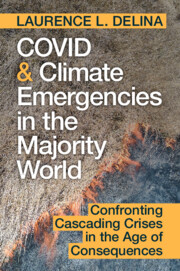 COVID and Climate Emergencies in the Majority World
COVID and Climate Emergencies in the Majority World Published online by Cambridge University Press: 22 June 2023
Civilisational collapse could occur. The cascading risks attached to climate change could happen within decades or half a century, so it is no longer the next generation that will carry the burdens of the climate emergency. Before the dominoes collapse, we must take climate risks seriously and act accordingly. If we act now, climate risks can be minimised, if not avoided.
To save this book to your Kindle, first ensure [email protected] is added to your Approved Personal Document E-mail List under your Personal Document Settings on the Manage Your Content and Devices page of your Amazon account. Then enter the ‘name’ part of your Kindle email address below. Find out more about saving to your Kindle.
Note you can select to save to either the @free.kindle.com or @kindle.com variations. ‘@free.kindle.com’ emails are free but can only be saved to your device when it is connected to wi-fi. ‘@kindle.com’ emails can be delivered even when you are not connected to wi-fi, but note that service fees apply.
Find out more about the Kindle Personal Document Service.
To save content items to your account, please confirm that you agree to abide by our usage policies. If this is the first time you use this feature, you will be asked to authorise Cambridge Core to connect with your account. Find out more about saving content to Dropbox.
To save content items to your account, please confirm that you agree to abide by our usage policies. If this is the first time you use this feature, you will be asked to authorise Cambridge Core to connect with your account. Find out more about saving content to Google Drive.